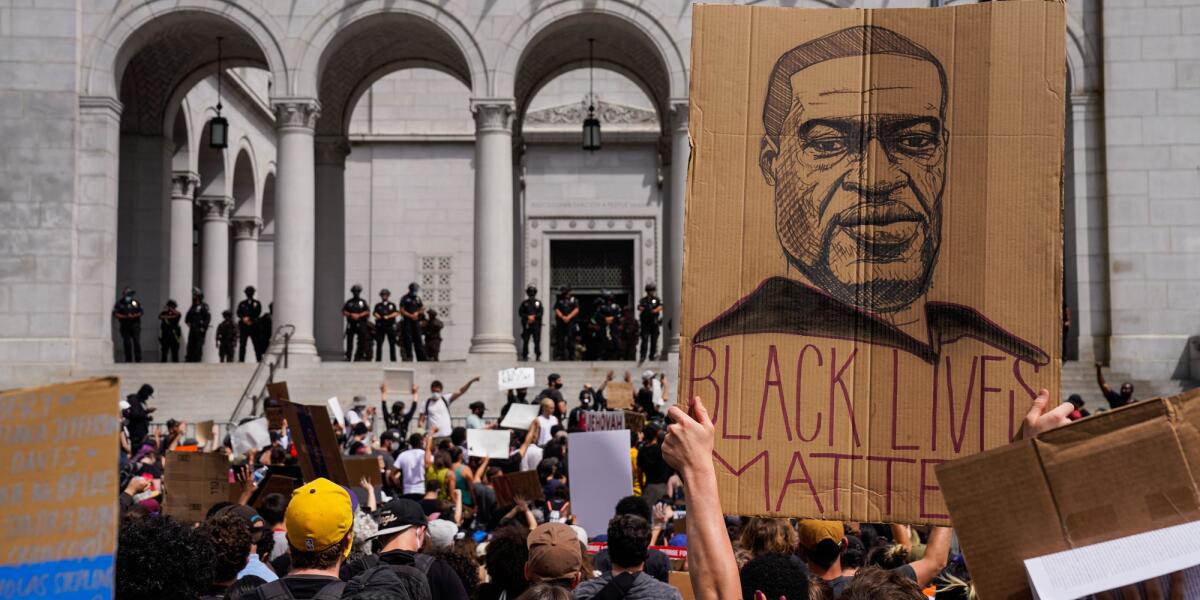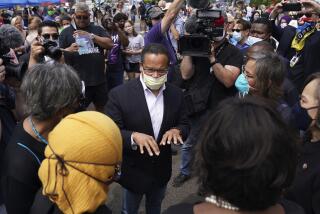Op-Ed: A year ago, U.S. businesses pledged to change in support of Black Lives Matter. How have they done?

Last summer, when Black Lives Matter protests rolled through nearly 550 towns and cities across the U.S., the business community reacted swiftly.
Two weeks after the senseless killing of George Floyd, American corporations pledged more than $1.7 billion to address racism and injustice. At the same time, company leaders publicly promised to make their organizations more diverse by improving anti-discriminatory hiring practices, pay parity and equitable access to advancement for people of color.
“Business has the transformative power to change and contribute to a more open, diverse and inclusive society. We can only accomplish this by starting from within our organizations,” wrote Vijay Eswaran, executive chairman of the multinational conglomerate QI Group.
One year later, it seems appropriate to ask what has become of this outpouring of good will. How many Black people have been hired or promoted? How many are at pay equity with their white peers? What are the results of the systems put in place to promote Black employees’ retention and career advancement?
History makes it clear how crucial accountability is for social justice. Although diversity and inclusion initiatives trace back to the Civil Rights Act of 1964, the chasm that separate promises — and even good faith efforts — from results remains stubbornly wide.
A February 2021 McKinsey report on race in the workplace describes Black employees as being 41% less likely to believe promotions are fair and 39% less likely to believe their company’s diversity, equity and inclusion programs are effective than white employees in the same company. Racial discrimination suits, among the most-filed complaints at the Equal Opportunity Employment Commission, result in relief only 15% of the time.
And of course, corporate support of social justice initiatives is not altogether altruistic. By speaking up for Black Lives Matter, companies position themselves to reap capitalistic benefits and avoid cancellation. According to a June 2020 survey, a majority of Americans of all generations —60% of the U.S. population — say that how a brand responds to racial justice protests will influence whether they buy or boycott the brand in the future.
Nonetheless — and not surprisingly — it’s not hard to find examples of companies publicly voicing solidarity with Black workers but not backing it up in their hiring practices and policies.
A study published in May looked at diversity in the technology industry and found that companies that made statements of support with Black Lives Matter had 20% fewer Black employees on average than those that didn’t.
As the protests were peaking in 2020, Amazon announced a $10-million donation to organizations supporting the fight against systemic racism and injustice, a figure that grew as the company matched employee donations. Since then, however, at its various businesses, it has racked up allegations of systemic bias against people of color, including retaliating against employees who wore Black Lives Matter paraphernalia, paying low wages to a disproportionately Black and Latino warehouse workforce and discriminating against them when it comes to promotions.
During this year’s proxy season, Amazon shareholders considered a proposal asking the board for an independent audit to assess the company’s equity policies. Although the proposal had backing at the May 26 shareholder meeting, it was voted down.
On the other hand, Starbucks, with social justice initiatives that stem from a much-publicized 2018 in-store racial profiling incident, recently released an independently produced report on its progress on civil rights concerns. The report includes metrics on racial/gender pay equity and its workforce demographics, as well as strategies for reassessing policies previously put in place and updates on how they are tracking to their long-range diversity goals.
Additionally, in April, BlackRock, the world’s largest asset management firm, announced that it too would get an independent audit of its racial equity and inclusion. This puts pressure on smaller firms to do the same.
A company’s dedication to the timely disclosure of complete equity data is the only way the public can assess whether its activism is performative or a real attempt at change. According to As You Sow, a shareholder advocacy organization, approximately two-thirds of companies in the S&P 500 made statements in support of racial justice in 2020, but tracking their progress toward goals they set was hampered because of a “serious lack” of data and transparency at the companies.
The tragedy of such lost accountability is best illustrated by Harvard University English professor and public intellectual Henry Louis Gates Jr., looking back at the “40 acres and a mule” promise to newly freed slaves — the first systemic attempt to mitigate racism: “Try to imagine how profoundly different the history of race relations in the United States would have been had this policy been implemented and enforced; had the former slaves actually had access to the ownership of land, of property; if they had had a chance to be self-sufficient economically, to build, accrue and pass on wealth.”
In 100 years, no one should have to imagine what might have been if the promises of equity and inclusion in 2020 were kept. Companies can be kept honest. Customers and consumers can demand that businesses promote the outcomes of their diversity programs, their process and even their struggles in the same way they promoted their aspirations a year ago.
The pledges made by American business last summer need not become the “thoughts and prayers” of the racial justice movement. Too much is at stake.
Ralinda Harvey Smith is a marketing and business strategy consultant and a freelance writer in Santa Monica. @ralinda
More to Read
A cure for the common opinion
Get thought-provoking perspectives with our weekly newsletter.
You may occasionally receive promotional content from the Los Angeles Times.










